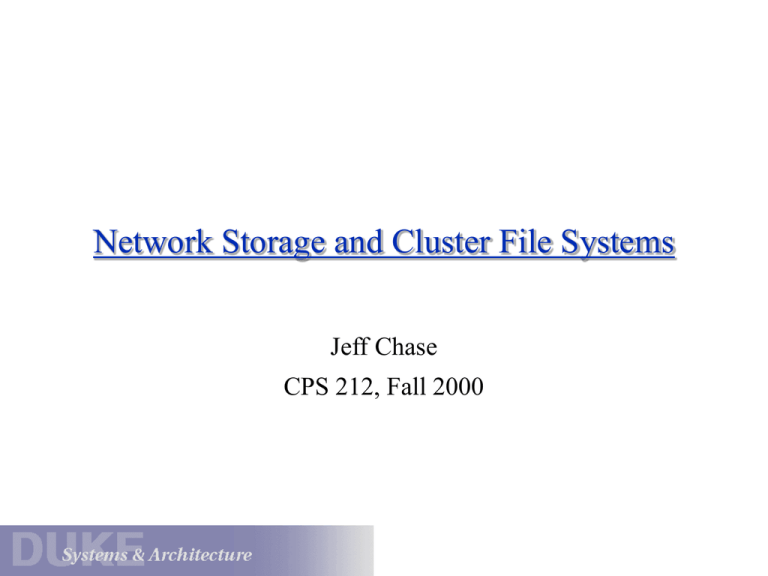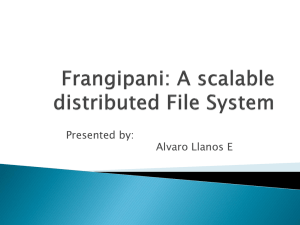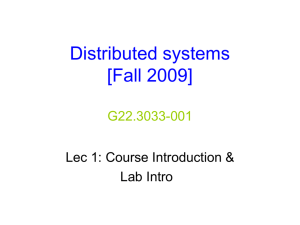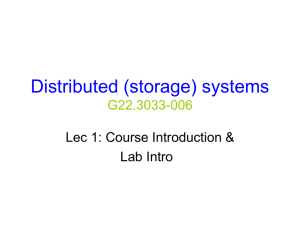Network Storage and Cluster File Systems
advertisement

Network Storage and Cluster File Systems Jeff Chase CPS 212, Fall 2000 Network Block Storage One approach to scalable storage is to attach raw block storage (“disks”) to a network. • dedicated Storage Area Network or general-purpose network FibreChannel (FC) vs. Ethernet….IETF working group is currently defining SCSI-over-IP (iSCSI). • Each network-attached “disk” may aggregate multiple disks in a box, with basic volume management. e.g., EMC, others sell RAID boxes attached through FC or SCSI. • Access control is a key issue if the network is untrusted. CMU NASD: Network-Attached Secure Disks suggests cryptographic capabilities to protect logical block spaces (“objects”) on disks. Network Storage Volumes A volume manager can knit multiple network disks (or partitions) into a unified logical block space (virtual disk). e.g., Petal, +Veritas and other companies sell volume managers and related “SAN management” products. • abstraction: OS addresses storage by <volume, sector>. Petal: access through souped-up device driver • shared access with scalable bandwidth and capacity • volume-based administrative tools backup, volume replication, remote sharing • volume manager may incorporate *ility features e.g., Petal is mirrored “NAS vs. SAN” In the commercial sector there is a raging debate today about “NAS vs. SAN”. • Network-Attached Storage has been the dominant approach to shared network storage since NFS. NAS == NFS or CIFS: named files over Ethernet/Internet. Network Appliance filers dominate, EMC coming on strong • Proponents of FibreChannel SANs market them as a fundamentally faster way to access shared storage. no “indirection through a file server” (“SAD”) lower overhead on clients network is better/faster (if not cheaper) and dedicated/trusted Brocade, HP, Emulex are some big players. NAS vs. SAN: Cutting through the BS • FibreChannel is a high-end technology incorporating NIC enhancements to reduce host overhead.... ...but bogged down in interoperability problems. • Ethernet is getting faster faster than FibreChannel. gigabit, 10-gigabit, + smarter NICs, + smarter/faster switches • Future battleground is Ethernet vs. Infiniband. • The choice of network is fundamentally orthogonal to storage service design. Well, almost: flow control, RDMA, user-level access (DAFS/VI) • The fundamental questions are really about abstractions. shared block volume (“SAN”) vs. shared file volume (NAS) vs. private disks (shared-nothing) Storage Abstractions • relational database (IBM and Oracle) tables, transactions, query language • file system hierarchical name space with ACLs • block storage/volumes SAN, Petal, RAID-in-a-box (e.g., EMC) • object storage object == file, with a flat name space: NASD, DDS • persistent objects pointer structures, requires transactions: OODB, ObjectStore Storage Architecture Any of these abstractions can be built using any, some, or all of the others. Use the “right” abstraction for your application. The fundamental questions are: • What is the best way to build the abstraction you want? division of function between device, network, server, and client • What level of the system should implement the features and properties you want? How does Frangipani answer them? Cluster File Systems cluster FS cluster FS volume client volume client shared block storage volumes (FC/SAN, Petal, NASD) xFS [Dahlin95] Petal/Frangipani [Lee/Thekkath] GFS Veritas cluster file server EMC Celerra issues trust compatibility with NAS protocols sharing, coordination, recovery Sharing and Coordination *FS client *FS client block allocation and layout locking/leases, granularity NAS shared access *FS svc *FS svc separate lock service logging and recovery “SAN” network partitions reconfiguration storage service + lock manager What does Frangipani need from Petal? How does Petal contribute to F’s *ility? Could we build Frangipani without Petal?











